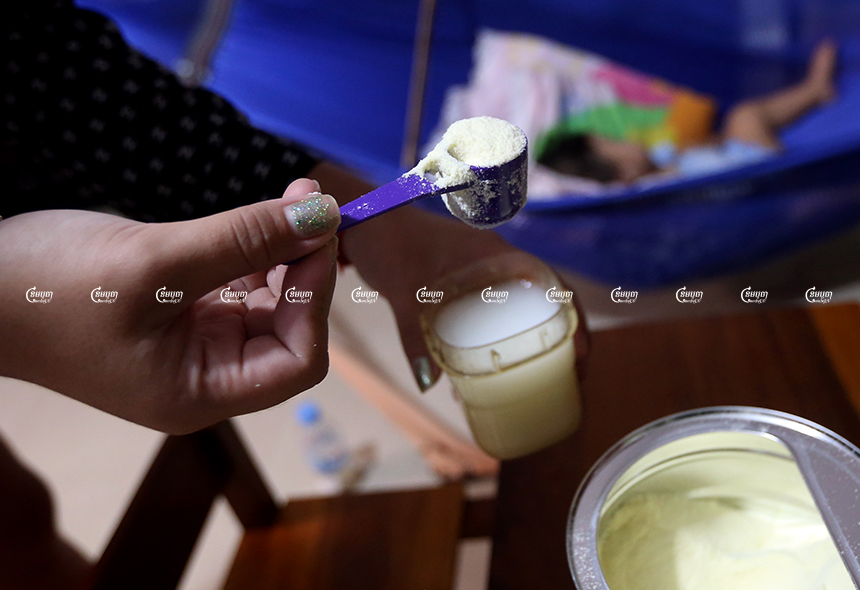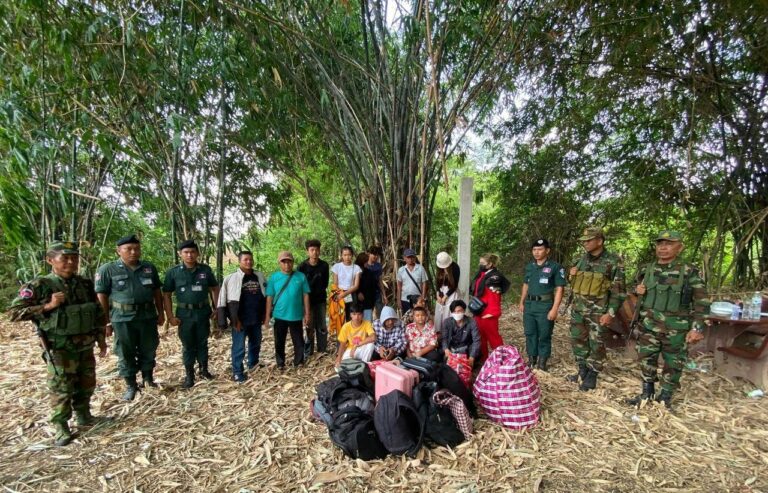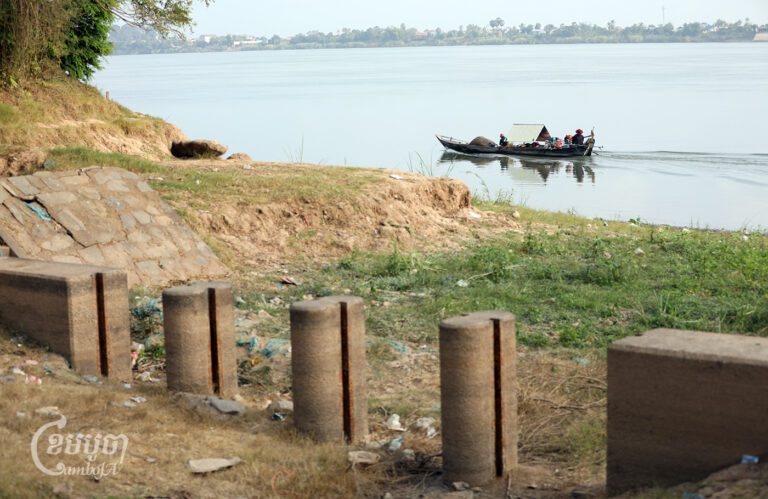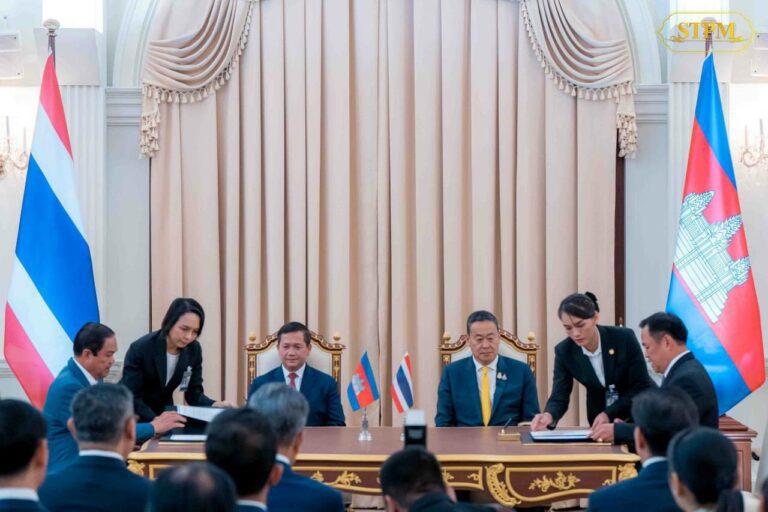Cambodian mothers are breastfeeding their babies less as the number of infant formula products expands, say non-governmental organizations.
At the same time, these organizations caution, it appears many producers are violating government regulations on the marketing of such products. As some mothers allege the use of low-quality infant formulas has caused their children to experience health problems, a collective of civil society groups has created a digital platform to make it easier for families to report instances of companies claiming that dairy-based breastmilk substitutes (BMS) are better or healthier than actual breastmilk.
This kind of advertising is illegal in Cambodia. But Grana Pu Selvi, a nutrition specialist with World Vision International Cambodia, said the expanded advertising of BMS products is likely connected to a general decline in breastfeeding rates in the Kingdom.
Studies of BMS marketing from 2015-18 found an increase in the number of companies violating rules about how they may present the qualities of their products, Selvi explained. The overall number of products advertised also grew from 110 to 165.
“These relentless campaigning efforts taken by these private marketing companies have affected the way families think about the benefits of breastfeeding,” she said.
In 2014, she said, 28 percent of Cambodians thought breast milk was better than BMS. Though Selvi didn’t have more recent data, she said that since then, the marketing companies have succeeded in presenting BMS as a symbol of modernity and economic status.
To help monitor potential violations of marketing rules for BMS, Selvi said a collective of organizations known as the Scaling Up Nutrition Civil Society Alliance (SUN CSA) Cambodia, of which World Vision is a member, has created an online form to help citizens report companies that claim that using their products is more beneficial than breastfeeding children.
“The system will allow anybody witnessing a violation to report it to the relevant authorities so they will impose sanctions as prescribed by the law to prevent violations that would endanger the lives of Cambodian babies and children,” she said.
The law in question is the Sub-Decree on Marketing of Products for Infant and Young Child Feeding, which aims to provide adequate and safe nutrition for infants and young children by protecting and promoting breast-feeding. The sub-decree also intends to ensure breast-milk substitutes are used properly and only when necessary.
A statement from World Vision and Helen Keller International Cambodia, both members of SUN CSA Cambodia, said ministries of health and commerce have worked with organizations such as those in the civil society alliance to improve monitoring of BMS advertising and labeling in places where such products are sold. The government in 2019 issued financial penalties to a number of companies in violation of the sub-decree, the statement read.
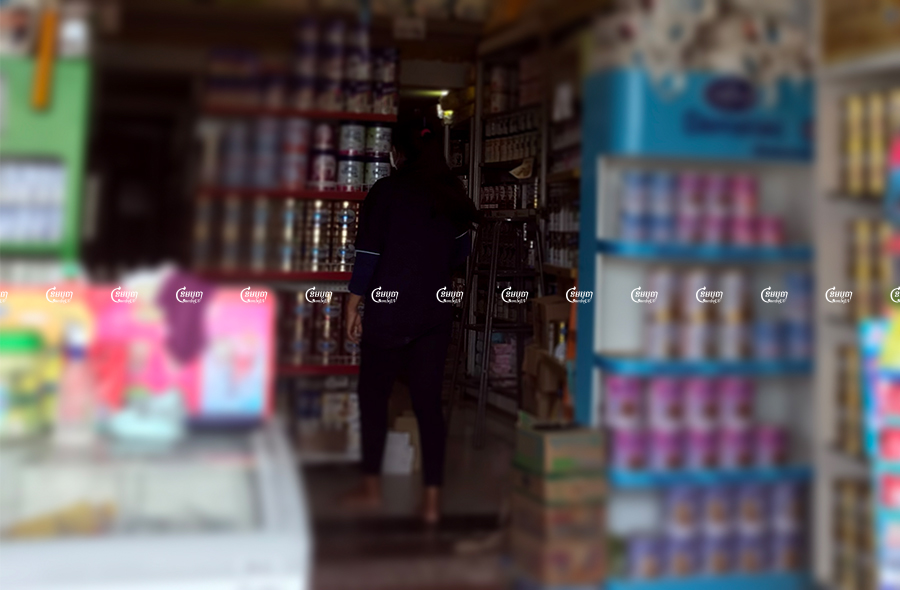
Some Cambodian mothers told CamboJA they want the government to more firmly regulate BMS products that they said caused health issues in their young children.
Lay Soknarath, 31, told CamboJA she had been feeding her two-year-old daughter with a powdered milk product for about two months when, last year, the child became pale and began vomiting.
“My daughter was always exhausted, vomiting, pale and slow, if compared to my niece at that age,” Soknarath said, adding that her daughter had even required a blood transfusion. “I was really shocked and regretful that I chose that product for my daughter.”
Soknarath’s daughter has recovered since then, but she hasn’t forgotten her ailment. Soknarath called on the Ministry of Health to carefully observe all imported milk products, saying the powders are promoted as healthy.
“It’s hard for a young mother like me to take care and choose the products because we believe in brand standards. The Ministry of Health also allowed them to be imported, so we trust in them,” Soknarath said.
She wasn’t aware of studies that showed companies had broken rules about advertising BMS products, but said she appreciates the SUN CSA Cambodia initiative and hopes people can participate closely to find and allow only quality products.
Another mother, Chan Sophany, said she ran into similar problems as Soknarath by feeding her child with a powdered milk formula. Sophany said she had given her baby son the BMS last year until his health took a turn. The baby grew pale and his movement and growth seemed to be slowed by using the formula.
“My [nine-month-old] son had a fever, so I brought him to the National Children’s Hospital,” she said, continuing that a doctor there had examined the child and found an issue with his blood.
Sophany had read the label of the BMS product and thought it was of good quality. But when the powder was tested by members of a government ministry, she continued, it was found to be of very poor quality. Her son has since gotten better, but the discovery of the harming effect of the BMS was an alarming lesson.
“It is so concerning for parents to choose milk powder because we believe in these brands and their labels, especially if the ministry has also permitted it to be delivered in Cambodia,” she said.
Phan Oun, director general of the Department of Consumer Protection, Competition and Fraud Prevention (CCF), said violations of the breastfeeding promotion sub-decree can take various forms, including both in labelling and form of advertisement.
“It is wrong, and their label must be in the Khmer language and quote that only mother’s breastfeeding is the best choice,” Oun said. “If their products lack nutrition, that affects children.”
“We will remove all products and sellers, and [these] companies will be facing the law,” he added.
Oun said pandemic conditions had contributed to gaps in the CCF’s work of observing and investigating stores across Cambodia that stock BMS. He said his office is working on an instructional campaign on the subject that might launch in October.
In the meantime, he said actual breastfeeding is the best choice for children to encourage their growth and development.
“If [mothers] feed their children with milk powder, please check the label [to make sure it is] recognized by the Ministry of Health and relevant authorities,” Oun said.


